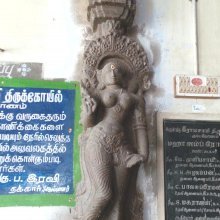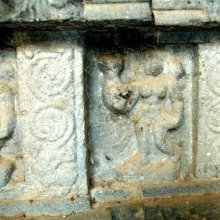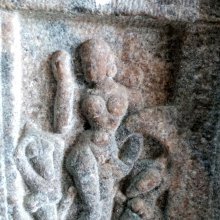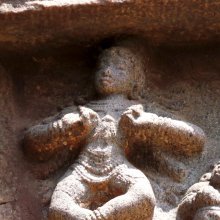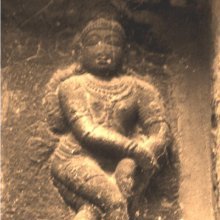Baddha, Baddhā: 26 definitions
Introduction:
Baddha means something in Buddhism, Pali, Hinduism, Sanskrit, Jainism, Prakrit, Marathi, Hindi. If you want to know the exact meaning, history, etymology or English translation of this term then check out the descriptions on this page. Add your comment or reference to a book if you want to contribute to this summary article.
Alternative spellings of this word include Baddh.
Images (photo gallery)
(+8 more images available)
In Hinduism
Purana and Itihasa (epic history)
Source: Cologne Digital Sanskrit Dictionaries: The Purana IndexBaddha (बद्ध).—(saṃsāra is bandhana); hence called so.*
- * Vāyu-purāṇa 102. 76.

The Purana (पुराण, purāṇas) refers to Sanskrit literature preserving ancient India’s vast cultural history, including historical legends, religious ceremonies, various arts and sciences. The eighteen mahapuranas total over 400,000 shlokas (metrical couplets) and date to at least several centuries BCE.
Natyashastra (theatrics and dramaturgy)
Source: Wisdom Library: Nāṭya-śāstraBaddhā (बद्धा) refers to a one of the thirty-two cārīs, according to the Nāṭyaśāstra chapter 11. The Baddhā-cārī is classified as a bhaumī, or “earthly”, of which there are sixteen in total. The term cārī refers to a “dance-step” and refers to the simultaneous movement of the feet (pāda), shanks (jaṅghā) and the hip (ūru). From these cārīs proceed dance as well as movements in general.
Source: archive.org: Natya ShastraBaddhā (बद्धा).—A type of earthly (bhaumī) dance-step (cārī);—Instructions: the sideways movement of the thighs when the two shanks are crossed.

Natyashastra (नाट्यशास्त्र, nāṭyaśāstra) refers to both the ancient Indian tradition (shastra) of performing arts, (natya—theatrics, drama, dance, music), as well as the name of a Sanskrit work dealing with these subjects. It also teaches the rules for composing Dramatic plays (nataka), construction and performance of Theater, and Poetic works (kavya).
Ayurveda (science of life)
Agriculture (Krishi) and Vrikshayurveda (study of Plant life)
Source: Shodhganga: Drumavichitrikarnam—Plant mutagenesis in ancient IndiaBaddhā (बद्धा) refers to “tying together” (the stems of certain plants), as prescribed by certain bio-organical recipes for plant mutagenesis, according to the Vṛkṣāyurveda by Sūrapāla (1000 CE): an encyclopedic work dealing with the study of trees and the principles of ancient Indian agriculture.—Accordingly, “If thick stems of Cucumis melo var. utilissiumus and Benincasa hispida plants are smeared with honey and melted butter then tied together (baddhā) with straw rope [baddhā palālarajjvā ca] and then covered with cow dung they become one. Later, if the stem is cut keeping the order of the root and tip, Cucumis melo var. utilissiumus, bears fruits of Benincasa hispida size”.
Unclassified Ayurveda definitions
Source: gurumukhi.ru: Ayurveda glossary of termsBaddha (बद्ध):—[baddhaṃ] Tieing / ligating / fastening

Āyurveda (आयुर्वेद, ayurveda) is a branch of Indian science dealing with medicine, herbalism, taxology, anatomy, surgery, alchemy and related topics. Traditional practice of Āyurveda in ancient India dates back to at least the first millenium BC. Literature is commonly written in Sanskrit using various poetic metres.
Shaktism (Shakta philosophy)
Source: Wisdom Library: ŚāktismBaddha (बद्ध, “tied”) refers to one of the sixty defects of mantras, according to the 11th century Kulārṇava-tantra: an important scripture of the Kaula school of Śāktism traditionally stated to have consisted of 125.000 Sanskrit verses.—Accordingly, as Īśvara says to Śrī Devī: “For those who do japa without knowing these defects [e.g., baddha—tied], there is no realization even with millions and billions of japa. [...] Oh My Beloved! there are ten processes for eradicating defects in Mantras as described. [...]”.
Source: Google Books: ManthanabhairavatantramBaddha (बद्ध) refers to “holding something (in one’s hand)”, according to the Śrīmatottara-tantra, an expansion of the Kubjikāmatatantra: the earliest popular and most authoritative Tantra of the Kubjikā cult.—Accordingly, [while describing the visualized form of Navātman Bhairava]: “[...] He who practices the Navātmānanda Bhairava, in this way quickly attains success. O fair lady, it is the means to attain all the things (one) desires. He who has Navātman in (his) heart holds (baddha) success in (his) hand. O fair lady, the Krama of one who does not deposit the Vaḍava Fire of Navātman is empty; (his) effort, O goddess, is useless. He is not liberated (and is like) those who are sunk in sinful action. O mistress of the God of the gods, he sinks into the ocean of transmigration which is hard to cross. [...]”.

Shakta (शाक्त, śākta) or Shaktism (śāktism) represents a tradition of Hinduism where the Goddess (Devi) is revered and worshipped. Shakta literature includes a range of scriptures, including various Agamas and Tantras, although its roots may be traced back to the Vedas.
Kavya (poetry)
Source: Brill: Śaivism and the Tantric Traditions (kavya)Baddha (बद्ध) refers to the “obstruction (of light/darkness)”, according to Bāṇa’s Kādambarī (p. 225-226).—Accordingly, while describing the shire of the Goddess Caṇḍikā, “[Then follows the image of the Goddess Caṇḍikā, which matches the conception of Kālarātri in the passage from the Mahābhārata:] Her feet were never bereft of cloths [dyed with] red lac thrown upon the mound of her seat [on the altar] as if they were the lives of all creatures arrived there for shelter; she resembled an inhabitant of the Underworld because of the intense darkness obstructed (baddha) [only] by the flashes from axes, spears, etc., weapons deadly for beings, that seemed to hold nets of hair stuck from decapitations because of the reflections of black yak-tail whisks cast [upon their surfaces]; [...]”.

Kavya (काव्य, kavya) refers to Sanskrit poetry, a popular ancient Indian tradition of literature. There have been many Sanskrit poets over the ages, hailing from ancient India and beyond. This topic includes mahakavya, or ‘epic poetry’ and natya, or ‘dramatic poetry’.
Shaivism (Shaiva philosophy)
Source: SOAS University of London: Protective Rites in the Netra TantraBaddha (बद्ध) refers to a “bound” (individual), according to the Netratantra of Kṣemarāja: a Śaiva text from the 9th century in which Śiva (Bhairava) teaches Pārvatī topics such as metaphysics, cosmology, and soteriology.—Accordingly, [verse 21.2-5]—“[...] An action of [one who is] bodiless cannot be seen, O Parameśvara. When having a body [results in a condition] in all living beings of [being] bound, how does the agency of the bound (baddha—kathaṃ baddhasya kartṛtā) [individual] contradict those agents [who are] devoid of power? Thus, [because] mantras consist of the nature of Śiva, how do they actually accomplish [anything]?”.

Shaiva (शैव, śaiva) or Shaivism (śaivism) represents a tradition of Hinduism worshiping Shiva as the supreme being. Closely related to Shaktism, Shaiva literature includes a range of scriptures, including Tantras, while the root of this tradition may be traced back to the ancient Vedas.
Yoga (school of philosophy)
Source: ORA: Amanaska (king of all yogas): A Critical Edition and Annotated Translation by Jason BirchBaddha (बद्ध) refers to “holding (the breath)” (in the body), according to the Vivekamārtaṇḍa 94ab-95.—Accordingly, while discussing the connection between mind and breath: “So long as the breath is held (baddha) in the body, then the mind is supportless [in meditation ...]. So long as the breath is in the body, the soul is not released [from it]. The [breath’s] departure is death. Therefore, one should restrain the breath [in the body]”.

Yoga is originally considered a branch of Hindu philosophy (astika), but both ancient and modern Yoga combine the physical, mental and spiritual. Yoga teaches various physical techniques also known as āsanas (postures), used for various purposes (eg., meditation, contemplation, relaxation).
In Buddhism
Mahayana (major branch of Buddhism)
Source: De Gruyter: A Buddhist Ritual Manual on AgricultureBaddha (बद्ध) refers to “having bound (all the winds)”, according to the Vajratuṇḍasamayakalparāja, an ancient Buddhist ritual manual on agriculture from the 5th-century (or earlier), containing various instructions for the Sangha to provide agriculture-related services to laypeople including rain-making, weather control and crop protection.—Accordingly [after Sāgara taught the Nāga-vow mantra], “[...] Arising from the residence in smoke form, a great cloud mass appears. Throwings should be made to the sky. No thunderbolts fall. All winds become bound (baddha). All cold spells and untimely winds calm down. One should offer arka wood, ghee, mustard seeds and oleander flowers 1,008 times. It should be performed at a Nāga lake, well, tank, lotus lake or on the top of a mountain. It will be successful everywhere. [...]”.

Mahayana (महायान, mahāyāna) is a major branch of Buddhism focusing on the path of a Bodhisattva (spiritual aspirants/ enlightened beings). Extant literature is vast and primarely composed in the Sanskrit language. There are many sūtras of which some of the earliest are the various Prajñāpāramitā sūtras.
In Jainism
General definition (in Jainism)
Source: The University of Sydney: A study of the Twelve ReflectionsBaddha (बद्ध) refers to “fixed” (friendship), according to the 11th century Jñānārṇava, a treatise on Jain Yoga in roughly 2200 Sanskrit verses composed by Śubhacandra.—Accordingly, “Those who were born as enemies [in a life] previously indeed become your friends whose friendship is fixed (baddha-sauhṛda) in this life on account of the power of fate”.

Jainism is an Indian religion of Dharma whose doctrine revolves around harmlessness (ahimsa) towards every living being. The two major branches (Digambara and Svetambara) of Jainism stimulate self-control (or, shramana, ‘self-reliance’) and spiritual development through a path of peace for the soul to progess to the ultimate goal.
Languages of India and abroad
Pali-English dictionary
Source: BuddhaSasana: Concise Pali-English Dictionarybaddha : (pp. of bandhati) bound; trapped; fastened; combined; put together.
Source: Sutta: The Pali Text Society's Pali-English Dictionary1) Baddha, 2 (nt.) (fr. bandhati) a leather strap, a thong Vin. I, 287 (T. bandha perhaps right, cp. ābandhana 3); PvA. 127. (Page 481)
2) Baddha, 1 (pp. of bandhati) 1. bound, in bondage M. I, 275; S. I, 133; IV, 91; Sn. 957 (interpreted as “baddhacara” by Nd1 464); Dh. 324.—2. snared, trapped J. II, 153; III, 184; IV, 251, 414.—3. made firm, settled, fastened, bound (to a cert. place) KhA 60 (°pitta, opp. abaddha°).—4. contracted, acquired Vin. III, 96.—5. bound to, addicted or attached to Sn. 773 (bhavasāta°, cp. Nd1 30).—6. put together, kneaded, made into cakes (of meal) J. III, 343; V, 46; VI, 524.—7. bound together, linked, clustered DhA. I, 304 kaṇṇika° (of thoughts).—9. set, made up (of the mind) DhA. I, 11 (mānasaṃ te b.). ‹-› Cp. ati°, anu°, a°, ni°, paṭi°, vini°, sam°.—añjalika keeping the hands reverently extended Dāvs III, 30.—rāva the cry of the bound (or trapped) J. IV, 279, 415 (v. l. bandhana°).—vera having contracted an enmity, hostile, bearing a grudge DhA. I, 324. (Page 481)

Pali is the language of the Tipiṭaka, which is the sacred canon of Theravāda Buddhism and contains much of the Buddha’s speech. Closeley related to Sanskrit, both languages are used interchangeably between religions.
Marathi-English dictionary
Source: DDSA: The Molesworth Marathi and English Dictionarybaddha (बद्ध).—p (S) Bound, fastened, tied.
Source: DDSA: The Aryabhusan school dictionary, Marathi-Englishbaddha (बद्ध).—p Bound, fastened, tied.
Marathi is an Indo-European language having over 70 million native speakers people in (predominantly) Maharashtra India. Marathi, like many other Indo-Aryan languages, evolved from early forms of Prakrit, which itself is a subset of Sanskrit, one of the most ancient languages of the world.
Sanskrit dictionary
Source: DDSA: The practical Sanskrit-English dictionaryBaddha (बद्ध).—p. p. [bandh-karmaṇi kta]
1) Bound, tied, fastened.
2) Chained, fettered.
3) Captured, caught.
4) Confined, imprisoned.
5) Put or girt on.
6) Restrained, suppressed, withheld.
7) Formed, built; शरबद्धमिवाभाति द्वितीयं भास्वदम्बरम् (śarabaddhamivābhāti dvitīyaṃ bhāsvadambaram)Rām.6.17.24.
8) Cherished, entertained.
9) Combined, united.
1) Firmly rooted, firm.
11) Shut, stopped, closed.
12) Inlaid, studded.
13) Composed (as verses).
14) Formed, contracted; असूत सा नागवधूपभोग्यं मैनाकमम्भोनिधिबद्धसख्यम् (asūta sā nāgavadhūpabhogyaṃ mainākamambhonidhibaddhasakhyam) Kumārasambhava 1.2.
15) Manifested, displayed.
16) Entangled, involved.
17) Congealed, clotted (as blood.)
18) Effected, caused, formed, produced; बद्धं जालकम् (baddhaṃ jālakam) Ś.1.29;2.6; Uttararāmacarita 6.17; Mālatīmādhava (Bombay) 3.7.
19) Possessed, preserved; बद्धं सन्तं मन्यते लब्धमर्थम् (baddhaṃ santaṃ manyate labdhamartham) Mahābhārata (Bombay) 5.92.23.
Source: Cologne Digital Sanskrit Dictionaries: Edgerton Buddhist Hybrid Sanskrit DictionaryBaddha (बद्ध).—(?) , m. or nt., in Divyāvadāna 40.2 gacchanti baddhaṃ (ed. note query. bandhaṃ?) mṛgāḥ, perhaps = Pali baddha, which = Sanskrit vadhra, vardhra, vārdhra, strap, thong (here of a snare).
Source: Cologne Digital Sanskrit Dictionaries: Shabda-Sagara Sanskrit-English DictionaryBaddha (बद्ध).—mfn.
(-ddhaḥ-ddhā-ddhaṃ) Bound, tied. 2. Checked, suppressed. 3. Fixed, firm. 4. Withheld. 5. Captured. 6. Confined. 7. United. 8. Displayed. 9. Cherished. E. bandh to bind, aff. kta, form irr.
--- OR ---
Baddhā (बद्धा).—Ind. 1. Having tied or bound. 2. Having killed. E. bandh to tie, or badh to kill, and ktvāc aff.
Source: Cologne Digital Sanskrit Dictionaries: Monier-Williams Sanskrit-English Dictionary1) Baddha (बद्ध):—a etc. See p. 720, col. 2.
2) [from bandh] b mfn. bound, tied, fixed, fastened, chained, fettered, [Ṛg-veda] etc. etc.
3) [v.s. ...] captured, imprisoned, caught, confined, [ib.] (śatāt, ‘for a debt of a hundred’ [Pāṇini 2-3, 24 [Scholiast or Commentator]])
4) [v.s. ...] bound by the fetters of existence or evil, [Kapila]
5) [v.s. ...] hanged, hung, [Rāmāyaṇa]
6) [v.s. ...] tied up (as a braid of hair), [Meghadūta]
7) [v.s. ...] (ifc.) stopped, checked, obstructed, impeded, restrained, suppressed, [Mahābhārata; Kāvya literature] etc.
8) [v.s. ...] girt with, [Śāṅkhāyana-śrauta-sūtra]
9) [v.s. ...] (with [instrumental case] or ifc.) inlaid or studded with, set in [Mahābhārata; Kāvya literature] etc.
10) [v.s. ...] attached to, riveted or fixed on ([locative case]), [ib.]
11) [v.s. ...] joined, united, combined, formed, produced, [ib.]
12) [v.s. ...] composed (as verses), [Rāmāyaṇa]
13) [v.s. ...] ([especially] [in the beginning of a compound]; cf. below) conceived, formed, entertained, manifested, shown, betrayed, visible, apparent (cf. jāta [in the beginning of a compound]), [Mahābhārata; Kāvya literature] etc.
14) [v.s. ...] clenched (as the fist), [Harivaṃśa; Rāmāyaṇa]
15) [v.s. ...] folded (as the hands), [Mṛcchakaṭikā]
16) [v.s. ...] contracted (as friendship or enmity), [Rāmāyaṇa; Śakuntalā]
17) [v.s. ...] taken up (as an abode), [Rājataraṅgiṇī]
18) [v.s. ...] built, constructed (as a bridge), [Rāmāyaṇa; Raghuvaṃśa]
19) [v.s. ...] embanked (as a river), [Rājataraṅgiṇī]
20) [v.s. ...] congealed, clotted (as blood; opp. to drava), [Suśruta]
21) [v.s. ...] alloyed (as quicksilver), [cf. Lexicographers, esp. such as amarasiṃha, halāyudha, hemacandra, etc.]
22) [v.s. ...] m. or n. ? (with Jainas) that which binds or fetters the embodied spirit (viz. the connection of the soul with deeds), [Monier-Williams’ Sanskrit-English Dictionary]
Source: Cologne Digital Sanskrit Dictionaries: Yates Sanskrit-English DictionaryBaddha (बद्ध):—[(ddhaḥ-ddhā-ddhaṃ) a.] Bound, tied.
Source: DDSA: Paia-sadda-mahannavo; a comprehensive Prakrit Hindi dictionary (S)Baddha (बद्ध) in the Sanskrit language is related to the Prakrit words: Bajja, Baddha.
[Sanskrit to German]
Sanskrit, also spelled संस्कृतम् (saṃskṛtam), is an ancient language of India commonly seen as the grandmother of the Indo-European language family (even English!). Closely allied with Prakrit and Pali, Sanskrit is more exhaustive in both grammar and terms and has the most extensive collection of literature in the world, greatly surpassing its sister-languages Greek and Latin.
Hindi dictionary
Source: DDSA: A practical Hindi-English dictionaryBaddha (बद्ध) [Also spelled baddh]:—(a) tied; bound; in bond; closed; fixed; ~[koṣṭha] suffering from constipation; ~[citta] concentrated, singlemindedly dedicated (to); ~[dṛṣṭī] with eyes concentrated on, gazing, staring; resolved; ~[niścaya] resolved; determined; ~[parikara] girded up; ~[pratijña] committed; having taken a vow; ~[muṣṭi] stingy, niggardly, parsimonious; ~[mūla] deep-rooted; ~[mauna] see ~[vāk; ~vāk] quiet, speechless; ~[vaira] with a deeprooted animosity; ~[sneha] attached (to), bound by love.
...
Prakrit-English dictionary
Source: DDSA: Paia-sadda-mahannavo; a comprehensive Prakrit Hindi dictionaryBaddha (बद्ध) in the Prakrit language is related to the Sanskrit word: Baddha.
Prakrit is an ancient language closely associated with both Pali and Sanskrit. Jain literature is often composed in this language or sub-dialects, such as the Agamas and their commentaries which are written in Ardhamagadhi and Maharashtri Prakrit. The earliest extant texts can be dated to as early as the 4th century BCE although core portions might be older.
Kannada-English dictionary
Source: Alar: Kannada-English corpusBaddha (ಬದ್ಧ):—
1) [adjective] tied; bound; fastened.
2) [adjective] fettered; shackled; imprisoned.
3) [adjective] done or doing as per rules, regulations.
4) [adjective] twisted or twined together.
5) [adjective] encircled; covered from all or almost all sides.
6) [adjective] that has become unable to move or flow out.
7) [adjective] controlled; checked.
8) [adjective] held, suppressed and maintained since long.
9) [adjective] inlayed; inserted.
10) [adjective] constructed; built.
11) [adjective] worn; put on.
12) [adjective] committed; pledged.
--- OR ---
Baddha (ಬದ್ಧ):—
1) [noun] a rope, string, chain etc. that is used to tie, fasten.
2) [noun] that which is tied, fasened or bound.
3) [noun] control; check.
4) [noun] the true or actual state of a matter; truth.
5) [noun] a rule or other order prescribed by authority to regulate conduct; regulation.
6) [noun] a man who is subjected to a rule or regulation.
7) [noun] (phil.) a person bound by worldly attachments.
8) [noun] (hist.) a particular manner of elaborating a rāga (a musical mode).
9) [noun] (dance.) a mode of moving forward.
Kannada is a Dravidian language (as opposed to the Indo-European language family) mainly spoken in the southwestern region of India.
See also (Relevant definitions)
Starts with (+128): Baddhabaddha, Baddhabandha, Baddhabhava, Baddhabhimandhakara, Baddhabhojana, Baddhabhrukuti, Baddhabhu, Baddhabhumi, Baddhabhumika, Baddhacara, Baddhachitta, Baddhacitta, Baddhadara, Baddhadarbha, Baddhadarshana, Baddhadhara, Baddhadhovayu, Baddhadrishti, Baddhadvesha, Baddhadveshi.
Ends with (+140): Ababaddha, Abaddha, Abhisambaddha, Ajnabaddha, Amgavabaddha, Amjalibaddha, Amtarbaddha, Anavabaddha, Anekakshatrabaddha, Anibaddha, Anirbaddha, Anubaddha, Anusambaddha, Apadabaddha, Apadibaddha, Apibaddha, Appadibaddha, Appatibaddha, Apratibaddha, Apratisambaddha.
Full-text (+390): Baddhanushaya, Baddhanjali, Baddhasuta, Baddhashikha, Sambaddham, Baddhapratishrut, Baddhamutra, Baddhavepathu, Baddhapurisha, Baddhatunira, Baddhakakshya, Baddhakesara, Jalabaddha, Sukhabaddha, Baddhadara, Baddhaparikara, Baddhananda, Baddhabhu, Romabaddha, Lohabaddha.
Relevant text
Search found 60 books and stories containing Baddha, Baddhā; (plurals include: Baddhas, Baddhās). You can also click to the full overview containing English textual excerpts. Below are direct links for the most relevant articles:
Garga Samhita (English) (by Danavir Goswami)
Verse 5.2.21 < [Chapter 2 - The Killing of Keśī]
Verse 6.7.31 < [Chapter 7 - The Marriage of Śrī Rukmiṇī]
Verse 6.7.32 < [Chapter 7 - The Marriage of Śrī Rukmiṇī]
Rig Veda (translation and commentary) (by H. H. Wilson)
Siddhanta Sangraha of Sri Sailacharya (by E. Sowmya Narayanan)
Brihad Bhagavatamrita (commentary) (by Śrī Śrīmad Bhaktivedānta Nārāyana Gosvāmī Mahārāja)
Verse 1.4.32 < [Chapter 4 - Bhakta (the devotee)]
Verse 2.2.65-66 < [Chapter 2 - Jñāna (knowledge)]
Verse 2.2.132 < [Chapter 2 - Jñāna (knowledge)]
Bhakti-rasamrta-sindhu (by Śrīla Rūpa Gosvāmī)
Verse 3.3.70 < [Part 3 - Fraternal Devotion (sakhya-rasa)]
Verse 2.4.152 < [Part 4 - Transient Ecstatic Disturbances (vyābhicāri-bhāva)]
Verse 4.5.10 < [Part 5 - Anger (raudra-rasa)]
Shrimad Bhagavad-gita (by Narayana Gosvami)
Verses 16.11-12 < [Chapter 16 - Daivāsura-sampada-yoga]
Verse 18.78 < [Chapter 18 - Mokṣa-yoga (the Yoga of Liberation)]
Verse 18.20 < [Chapter 18 - Mokṣa-yoga (the Yoga of Liberation)]
Related products

